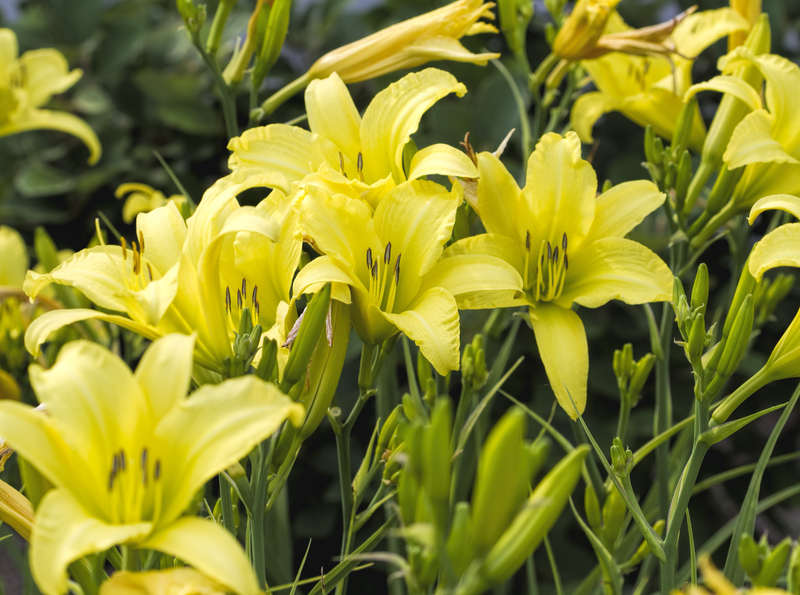Metamorphosing Waste into a Nutrient-Rich Soil Treasure
Posted on 19/09/2025
Metamorphosing Waste into a Nutrient-Rich Soil Treasure: The Future of Sustainable Gardening
Turning trash into treasure isn't just a catchy phrase--it's the driving force behind a sustainable gardening revolution. Metamorphosing waste into nutrient-rich soil not only benefits our environment but also unlocks new potential for healthier gardens and greener Earth.
What Does It Mean to Metamorphose Waste?
Metamorphosing waste is more than simply disposing of kitchen scraps or raking up leaves. It's a comprehensive process that transforms organic waste, kitchen discards, yard clippings, and even certain paper products into a nutrient-rich soil amendment, commonly known as compost. This *alchemical change* rewrites the narrative on waste, making it a valuable resource for future growth.
Why Is Transforming Waste Important?
- Reduces landfill use: Diverting waste away from landfills limits methane emissions, a potent greenhouse gas.
- Enriches soil structure: Nutrient-dense compost improves the structure, aeration, and water retention of soil.
- Promotes biodiversity: Healthy soils foster robust microbial life and a thriving ecosystem.
- Saves money: Homemade compost reduces the need for chemical fertilizers and lowers gardening expenses.

The Science Behind Soil Treasure: Composting Innovations
Composting is the core process in the journey of metamorphosing waste into nutrient-rich soil. But how does it work? The secret lies in the synergy of microorganisms, oxygen, moisture, and the right carbon-to-nitrogen ratio. These elements collaborate to break down organic matter into humus--a dark, crumbly, and nutrient-packed soil booster.
Key Ingredients for Creating Nutrient-Rich Soil from Waste
- Browns (Carbon-rich): Dried leaves, twigs, cardboard, shredded paper.
- Greens (Nitrogen-rich): Vegetable peels, fruit scraps, coffee grounds, fresh grass clippings.
- Moisture: Ensures decomposition by allowing microbes to thrive.
- Oxygen: Required for aerobic bacteria, which efficiently turn waste into compost without offensive odors.
Composting Methods: Which One Should You Choose?
Transforming organic waste into soil gold doesn't have a one-size-fits-all solution. Depending on space, time, and needs, gardeners and eco-enthusiasts can select from:
- Traditional backyard composting: Ideal for gardens and larger yards, this method uses open piles and bins.
- Vermicomposting: Harnesses the power of worms, notably red wigglers, to digest waste and produce rich worm castings.
- Bokashi fermentation: An anaerobic process that rapidly ferments waste, including dairy and meat, before final decomposition in soil.
- Tumbler composting: Closed containers are rotated regularly, speeding up decomposition and preventing pest issues.
The Magic of Compost: Nutritional Benefits for Your Garden
So, why is this soil treasure so valuable? The metamorphosis of waste into nutrient-rich soil brings myriad benefits:
- Boosts soil fertility: Packed with essential nutrients like nitrogen, phosphorus, and potassium.
- Enhances soil structure: Improves porosity, allowing roots to penetrate deeper and absorb more water and nutrients.
- Supports beneficial organisms: Compost teems with microbial life that helps plants fight disease and assimilate minerals.
- Increases water retention: Reduces irrigation needs and helps plants stay resilient during droughts.
- Suppresses plant diseases: Healthy microbe populations keep harmful pathogens in check.
Step-by-Step Guide: How to Transform Organic Waste into Garden Gold
- Start collecting: Allocate a lidded pail or container for kitchen scraps. Regularly add food waste, skipping meats, fats, and large bones.
- Build your pile: Alternate layers of browns (leaves, cardboard) and greens (fruit peels, coffee grounds) in your compost area or bin.
- Add moisture: Keep the compost moist but not soggy--think of a wrung-out sponge.
- Provide oxygen: Regularly turn the pile with a pitchfork or compost turner to aerate and speed up decomposition.
- Monitor and wait: Over weeks or months, the pile heats up, cools down, and breaks down into dark, crumbly soil.
- Harvest your compost: When the material is unrecognizable and earthy-smelling, it's ready to enrich your garden beds, potted plants, or lawn.
Urban Composting: Turning City Waste into a Soil Asset
Don't have a backyard? Metamorphosing waste into nutrient-rich soil treasure is perfectly possible in urban environments:
- Vermicomposting bins: Fit neatly under kitchen sinks or in apartments, producing no smells and offering easy harvests of worm castings.
- Bokashi buckets: Seal in odors and efficiently ferment waste in even the smallest spaces.
- Community composting: Shared bins or drop-off sites let city dwellers contribute scraps to neighborhood compost programs.
Many cities now provide municipal composting services, collecting yard and kitchen waste separately and returning finished compost to the community. This collaborative approach helps close the loop on local food and waste systems.
Composting Mistakes to Avoid
- Adding meat, dairy, or oily foods: Attracts pests and slows decomposition.
- Neglecting brown materials: Too many greens make compost slimy and smelly; balance with carbon-rich browns.
- Letting the pile dry out: Microbes need moisture--keep the pile as damp as a sponge.
- Ignoring aeration: No oxygen means anaerobic bacteria thrive, causing foul odors.
Advanced Techniques: Maximizing Your Soil's Potential
Metamorphosing waste into nutrient-rich soil treasure doesn't stop with basic composting. Savvy gardeners and eco-innovators enhance outcomes by:
- Compost teas: Steeping mature compost in water to brew a nutrient- and microbe-rich solution for foliar feeding.
- Mulching: Using partially decomposed organic matter as a top layer to suppress weeds, retain moisture, and slowly nourish soil.
- Biochar amendments: Adding carbon-rich charred biomass improves soil fertility and carbon sequestration.
- Layered lasagna gardening: Building raised beds with alternating layers of "greens," "browns," and soil for in-place composting.
How Composting Supports a Circular Economy
Composting is a keystone in the circular economy model. Instead of a linear system where waste is produced and discarded, composting turns "waste" into a resource that powers the next cycle of growth. Each banana peel or autumn leaf becomes a contributor to healthier soils, robust crops, and ultimately more organic waste to begin the process anew.
Environmental Benefits of Composting and Soil Enrichment
Metamorphosing waste into nutrient-rich soil treasure isn't just about better tomatoes or lusher lawns. The ecological payoffs are profound:
- Reduces greenhouse gas emissions: Organics in landfills emit methane; composting is a climate-friendly alternative.
- Improves soil carbon sequestration: Rich organic matter stores carbon, helping combat climate change.
- Filters water: Improved soil structure helps filter runoff, protecting groundwater from pollutants.
- Restores degraded land: Regular compost applications heal erosion-prone or depleted soils, making land productive again.

Nutrient-Rich Soil: Foundation for Healthy Plants and People
Your newly created soil treasure is more than just a foundation for plant roots. Nutrient-rich soil:
- Supports higher yields: Crops grow stronger, faster, and more resilient.
- Enhances nutritional value: Healthier soils mean fruits and vegetables contain more minerals and vitamins.
- Builds food security: Locally produced compost supports sustainable, community-oriented agriculture.
Frequently Asked Questions about Composting and Soil Transformation
- Q: Can I compost pet waste?
A: While some pet wastes can be composted using specialized systems (like dedicated pet composters), it's safest to avoid adding dog or cat feces to regular compost piles used for food gardens, due to potential pathogens. - Q: How long does it take to turn waste into compost?
A: Time frames vary from a few months (with hot, well-managed piles) up to a year (for cool, neglected bins). Vermicomposting and bokashi are usually faster than traditional methods. - Q: Will my compost pile attract pests?
A: When managed properly (balancing greens/browns, excluding animal products, and keeping it tidy), pests are minimal. Closed bins provide extra assurance in urban settings. - Q: Can I compost weeds or diseased plants?
A: Hot compost piles (130-150?F) can kill most weed seeds and pathogens, but avoid adding invasive weeds or sick plants to cool compost systems.
Conclusion: Harnessing the Alchemy of Composting for a Greener Tomorrow
Metamorphosing waste into a nutrient-rich soil treasure is a small act with world-changing potential. From urban balconies to rural fields, every banana peel, leaf, and coffee ground represents a step toward more resilient soils, sustainable gardening, and a healthier planet.
By embracing composting and soil enrichment, we nurture not only our gardens, but also local communities and the natural cycles that sustain us. The journey from waste to wealth is under your feet--dig in, and help create soil gold for future generations.
Latest Posts
Winning the Weather War: Essential Garden Protection Tips
Find Serenity with These Innovative Zen Garden Ideas
Give Your Orchids the Care They Deserve

